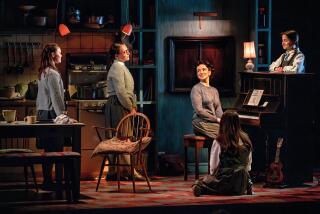STAGE REVIEW : ‘A MEDEA’: NIGHTMARISH VISIONS GET A WORKOUT
- Share via
Some of us may recall Medea as that madwoman of Corinth. Some of us may know next to nothing about Euripides’ psychological tragedy of a passionate woman’s love revenged. Those in either camp who see Reza Abdoh’s radicalized, ritualistic version at the Hollywood Recreation Center will know they haven’t seen anything quite like this before. A few might wonder where it came from.
Imps and purists will say Mars, but they would be missing the essential ingredient here. Abdoh calls this version (one of four he has written, the first staged) “A Medea: Requiem for a Boy With a White, White Toy,” implying that it’s just one look at the work, with many more possible. Like any experimentalist, Abdoh is juggling various elements together in his theatrical beaker to see what mixes. And what does not.
Take his lab cum space--a large basketball gym, with three rows of audience seating at the north goal, and the action filling the remaining area, including a curtained stage at the distant rear. Lights emanate from the “wings,” along the length of the sidewalls; actors sit on the sidelines when out of a scene; and the audience takes a goal defender’s perspective, keeping one eye on action close at home, and another on any skirmishing downcourt. It’s not the best view for a game, but it’s a frequently thrilling sight for the playgoer.
It’s also one element in the experiment Abdoh (who also directed and designed) should not toss out. In fact, most of the first half captivates precisely because the movement and drama is designed for this depth of field perspective. When Abdoh succeeds, he makes your head feel like a camera focusing, panning and tracking across an increasingly wondrous landscape.
The terrain is often beautiful (a chorus of women dressed in white, singing songs of ghostly lament) and shocking (a woman agonizingly gives birth to a lobster) but it contains a clear mythic center: the female psyche in a kaleidoscopic range of expression from rage to joy. If Medea seems almost peripheral here, her essential course of mind--as Euripides saw it--is not. Her innate sense of betrayal at the hands of her lover Jason, whom she helped obtain the Golden Fleece, is the feeling of values violated. It’s not nice to fool a sorceress.
If only Jessica Peterson’s Medea conveyed this in tandem with Abdoh’s scenography. She comes off as a cipher when she should compel our emotions. As with Eric Marx’s Jason, a vacuum waits to be filled by an actor with some command of character.
The suspicion persists to the end of the three-hour-plus show that the director’s ability to think through the original “Medea” and rearrange it in a new way vastly outpaces the abilities of the cast. Abdoh and his company are young, committed, often inspired, but the actors are frequently lost in the director’s conception.
This is the unavoidable feeling left by the second half, where the delicate, often witty moods of earlier are dropped for a dark, Latin-like world of spiked heels, card games, sexual fears and murder.
We realize that what we’re really watching are Medea’s nightmares come to life. But they become exhausting and repetitious, and miss the target of the soul. And because, by this point, Tom Fitzpatrick’s sinister Creon is the only character brought to life, we have no connection to the person(s) behind the nightmares. Macbeth’s famous remark, quoted here, about sound and fury signifying nothing begins to haunt this staging as it runs off course.
Still, what stage pictures we take home: the (at least) 30-foot giant (god?) looming over the rites and passages like a pompous sentinel, or a wildly brilliant tap dancer (Kip Konwiser) cutting through the Greek chorus like a Brechtian Gene Kelly. Abdoh, lighting designer Jim Okumura and costumer Anisa Boudjakdja could, with a budget, blow the roof off any theater in town. Right now, they have a beautiful mess. But what experiment isn’t--at first?
Performances at 1122 N. Cole Ave., Hollywood; Fridays through Sundays, 8 p.m. Ends Aug. 3; (213) 851-3872.
More to Read
The biggest entertainment stories
Get our big stories about Hollywood, film, television, music, arts, culture and more right in your inbox as soon as they publish.
You may occasionally receive promotional content from the Los Angeles Times.










